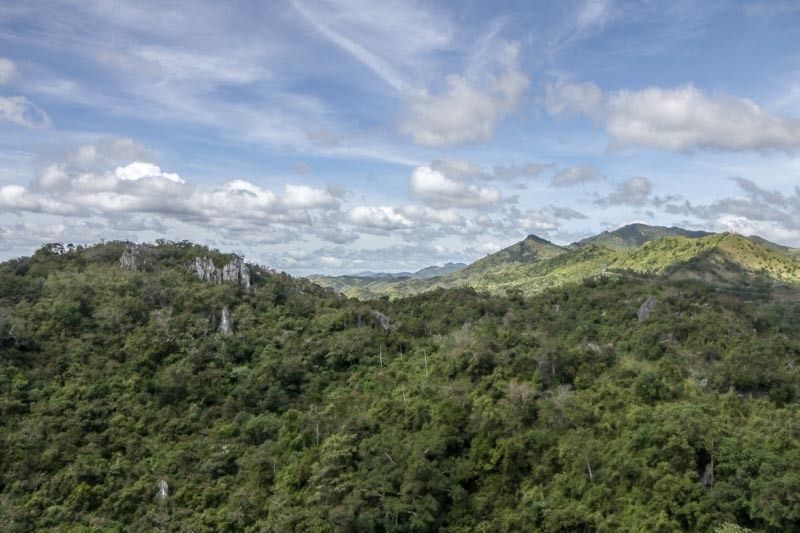Glasgow forest pledge 'better', but implementation and focus on protection needed

GLASGOW, United Kingdom — A new pledge to halt deforestation and land degradation is a welcome move as forests steadily disappear, but it should be followed by urgent implementation of commitments and policies that focus on protection and restoration, environmentalists said.
During the first week of the COP26 climate talks, more than 140 nations—including the Philippines—signed the Glasgow Leaders’ Declaration on Forest and Land Use, committing to halt and reverse forest loss, and land degradation by 2030.
The Glasgow pledge was not the first of its kind. In 2014, a similar commitment was made under the New York Declaration on Forests. The pledge, however, failed.
But for conservationists, the declaration in Glasgow provided some hope.
“I won’t say it’s a game changer, but it’s better than the previous declarations,” said Jose Andres Canivel, executive director of the Forest Foundation Philippines.
Under the Glasgow declaration, 12 countries will provide $12 billion of public finance for the protection, restoration and sustainable management of forests. Private sector investors will provide $7.2 billion.
Signatories also vowed to empower local communities, develop profitable and sustainable agriculture, and acknowledge the multiple values of forests while recognizing the rights of indigenous peoples and local communities.
“We had a very good day in Glasgow. But we need to transform all these pledges and commitments, political discourses into real life actions, and it’s urgent,” Josefina Braña Varela, vice president for forests and forest climate solutions lead at World Wildlife Fund-US, told Philstar.com on the sidelines of COP26.
Local declaration needed
Forests absorb around a third of the planet-warming carbon emissions released from burning fossil fuels every year. Forests also provide food and livelihoods, clean air and water, and are an important habitat for wildlife and indigenous peoples.
But the world is losing around 10 million hectares of forests each year.
The Department of Environment and Natural Resources vowed to support the commitments made during the climate conference.
“The DENR will be at the frontlines of ensuring that the verdant forest covers will be replenished to ensure adequate carbon sequestration to meet the country’s contributions to sustain the goal of the Paris Agreement,” DENR Secretary Roy Cimatu said in a release.
For the Glasgow pledge to work, the Philippine government must craft a local declaration that will support it, WWF-Philippines Forests for Water program manager Paolo Pagaduan stressed.
“A supporting policy document to the COP26 deforestation pledge that stops all deforestation in the country would be a monumental achievement for the Philippines. In it, we have to articulate what we mean by stopping deforestation and how to achieve it before 2030,” Pagaduan said.
He added that in a country where forests are cleared for agricultural activities or development projects, there is a need to properly balance environment protection and economic interests in land-use policies.
Data from DENR’s Forest Management Bureau showed the Philippines, one of the severely deforested countries in the tropics, had a little over 7 million hectares of forest left in 2015. Ninety percent of the archipelago was believed to be covered by forests in the 16th century.
"It boils down to the land because forests will not fully thrive and be able to provide all its benefits for nature, biodiversity, and the climate on the same space as agricultural fields, real estate, or other infrastructure developments," Pagaduan said.
Community participation
Canivel emphasized that governments need to focus on forest protection and restoration for the Glasgow declaration to succeed where others have failed.
The Glasgow pledge does not spell out how countries attain the target and does not define what forests are—whether natural forests only or also plantations.
"We just need to align our policies to support protection and restoration rather than conversion to plantation and other uses through the participation of indigenous peoples’ communities," he said.
More than a half of the land on the planet is collectively held by indigenous peoples and local communities, and numerous studies have documented the contributions of indigenous communities in conserving the areas they call home.
Canivel also called on local government units to develop long-term restoration plans that will support the vision of communities on the ground and invest in local capacity building.
He added the Philippine government’s Community-Based Forestry Management program, which encourages reforestation and sustainable management of forests and its resources, must be "tweaked a little." The strategy was criticized for the lack of proper implementation and the lack of coordination between government agencies, which are needed for its success.
"If we do that, we will be empowering local communities, LGUs to play bigger roles in forest management. At the same time, it will be context-driven, purpose-oriented, unlike national programs that have targets," he said.
No time to waste
For Louise del Castillo, a forestry student at the University of the Philippines Los Baños chosen to attend COP26, the pledge to halt deforestation is a "big step."
"I hope it won’t just be lip service because we are seeing the destructive impacts of climate change. A lot of us are affected by it," del Castillo said, adding government agencies, local stakeholders, private sectors and even consumers should work together to deliver on this commitment.
WWF’s Varela said the pledge must be followed up by urgent implementation.
"We cannot afford to lose more time so we really need to move forward in channeling these pledges, and materializing and transforming these into real-life actions," Varela said.
"We are in the middle of climate and nature emergency. There is no more time for us to waste."
This story was produced as part of the 2021 Climate Change Media Partnership, a journalism fellowship organized by Internews' Earth Journalism Network and the Stanley Center for Peace and Security.
- Latest































